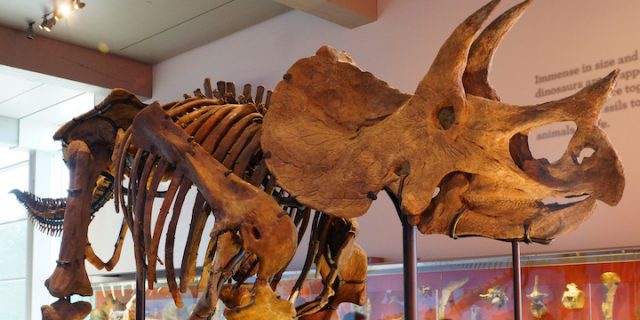The biological theory of evolution has been the subject of argument ever since it was first proposed, especially from those christians who believe that the Bible teaches that animals haven’t evolved from simple life forms, and thus evolutionary science must not only be wrong, but also evil. But their arguments are often naive and misleading.
Of course many christians (including me) accept evolution as a scientific fact, even if some of the details are still doubtful. But secular scientists must sometimes get tired of answering the naive arguments of fervent creationists, which sometimes leads them into their own poor responses.
Here are a couple of cases in point …..
Mary Schweitzer and Tyrannosaurus rex
Mary is a molecular paleontologist who has been researching the proteins found in Tyrannosaurus rex bones for about 20 years. In 2005 she reported that she had been able to extract soft tissue (collagen) from some bones, something that surprised scientists because it was considered impossible for such proteins to survive anywhere near as long as the 68 million years since the dinosaur was alive.
Other scientists disputed her findings, but more recent research has confirmed her work. This has led to creationists claiming that her discoveries show that the earth is quite young after all, and contesting her explanation that the presence of iron has preserved the protein.
But the criticism hasn’t been all from that side. Schweitzer is a committed christian who accepts the science of evolution, but has reported some scientists have questioned her results because of her faith. For example:
I had one reviewer tell me that he didn’t care what the data said, he knew that what I was finding wasn’t possible … . I wrote back and said, ‘Well what data would convince you?’ And he said, ‘None.’”
Mark Armitage and Triceratops
Mark Armitage was a university microscopist expert in “scanning electron microscopy, transmission electron microscopy, confocal microscopy and tissue processing and sectioning” when he reported in a scientific paper in 2013 that he had found soft tissue in the horn of a 65 million year old Triceratops.
Mark is a creationist christian but he made no mention in the paper of any possible implications of his find. Nevertheless he believes that soft tissue is widespread in old bones and fossils, and cannot be explained except by a young earth. It was also claimed that carbon dating showed the bone was much younger than you’d expect if evolution was true. I haven’t seen much scientific response to his report, but biologist Jerry Coyne says his claims are not credible.
Armitage discussed some of the implications with students and he was soon facing criticism. He reported that one university offical reacted by saying to him: “We are not going to tolerate your religion in this department!” and he was subsequently dismissed from the university.
Recently the university settled a case for wrongful dismissal out of court for a large sum. Although they claimed his dismissal was for budgetary reasons, the suspicion remains it was in response to his creationist views.
Time to take a cold shower?
It seems to me that both “sides” need to reconsider their approach in matters like these.
Creationists
Creationists must understand that one piece of adverse evidence doesn’t undermine evolution. Evolutionary science is based on a mountain of research results over more than a century, and it is foolish to suggest that one result will overturn that. If evolution is ever to be shown to be wrong, it will be the result of slow and methodical research over many years.
Evolutionists
Evolutionists must beware of being as unscientific as the creationists they criticise. If a research report appears to present evidence against evolution, shooting the messenger because they are a christian is neither scientific nor helpful. If the report is wrong or misleading, the correct response is to show this by careful science, not knee-jerk rejection.
A better way?
The correct response by both sides, surely, is to accept the research unless it is clearly incompetent, but make no immediate claims in support or against. Science proceeds by investigating anomalies and finding how they fit into the bigger scientific picture, and this takes time.
The time to be making pronouncements, either for or against evolution, is after the report has been verified or falsified by further research, and evidence-based explanations either found, or found to be difficult.
In the meantime, the soft tissue found in ancient bones apparently remains only partly explained at this stage.
Photo: Triceratops skeleton in Natural History Museum, Los Angeles, Wikimedia Commons





I am just finding this blog but I love it already! I grew up in a very science heavy background and never really believed in God. This last year I started going to church and my life has changed dramatically for the better. I gladly say I am christian now but I still accept things like evolution as a reality.
Just because I believe in evolution doesn’t mean I discount God or vice-versa!
Alex – http://www.fixmybrokenmind.com
Hi Alex, good on you! Thanks for the encouragement. I think you are exactly the sort of person I write this website for!
Some christians find it difficult to accept evolution because they have been taught that evolution and God don’t go together. That may be true if we accept the early parts of the Bible as totally literal history and science, but if we see that it could be picture language or something like that, something appropriate to pre-scientific people, then most of the difficulties evaporate.
What branch of science did you grow up with?